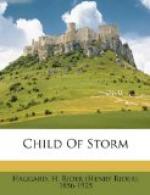As he spoke, throwing his hands upwards, there arose at his very feet one of those tiny and incomprehensible whirlwinds with which all who know South Africa will be familiar. It drove the dust together; it lifted it in a tall, spiral column that rose and rose to a height of fifty feet or more. Then it died away as suddenly as it had come, so that the dust fell down again over Zikali, over the King, and over three of his sons who sat behind him. Those three sons, I remember, were named Tshonkweni, Dabulesinye, and Mantantashiya. As it chanced, by a strange coincidence all of these were killed at the great battle of the Tugela of which I have to tell.
Now again an exclamation of fear and wonder rose from the audience, who set down this lifting of the dust at Zikali’s very feet not to natural causes, but to the power of his magic. Moreover, those on whom it had fallen, including the King, rose hurriedly and shook and brushed it from their persons with a zeal that was not, I think, inspired by a mere desire for cleanliness. But Zikali only laughed again in his terrible fashion and let it lie on his fresh-oiled body, which it turned to the dull, dead hue of a grey adder.
He rose and, stepping here and there, examined the new-fallen dust. Then he put his hand into a pouch he wore and produced from it a dried human finger, whereof the nail was so pink that I think it must have been coloured—a sight at which the circle shuddered.
“Be clever,” he said, “O Finger of her I loved best; be clever and write in the dust as yonder Macumazana can write, and as some of the Dwandwe used to write before we became slaves and bowed ourselves down before the Great Heavens.” (By this he meant the Zulus, whose name means the Heavens.) “Be clever, dear Finger which caressed me once, me, the ‘Thing-that-should-not-have-been-born,’ as more will think before I die, and write those matters that it pleases the House of Senzangakona to know this day.”
Then he bent down, and with the dead finger at three separate spots made certain markings in the fallen dust, which to me seemed to consist of circles and dots; and a strange and horrid sight it was to see him do it.
“I thank you, dear Finger. Now sleep, sleep, your work is done,” and slowly he wrapped the relic up in some soft material and restored it to his pouch.
Then he studied the first of the markings and asked: “What am I here for? What am I here for? Does he who sits upon the Throne desire to know how long he has to reign?”
Now, those of the inner circle of the spectators, who at these “smellings-out” act as a kind of chorus, looked at the King, and, seeing that he shook his head vigorously, stretched out their right hands, holding the thumb downwards, and said simultaneously in a cold, low voice:
“Izwa!” (That is, “We hear you.”)
Zikali stamped upon this set of markings.
“It is well,” he said. “He who sits upon the Throne does not desire to know how long he has to reign, and therefore the dust has forgotten and shows it not to me.”




